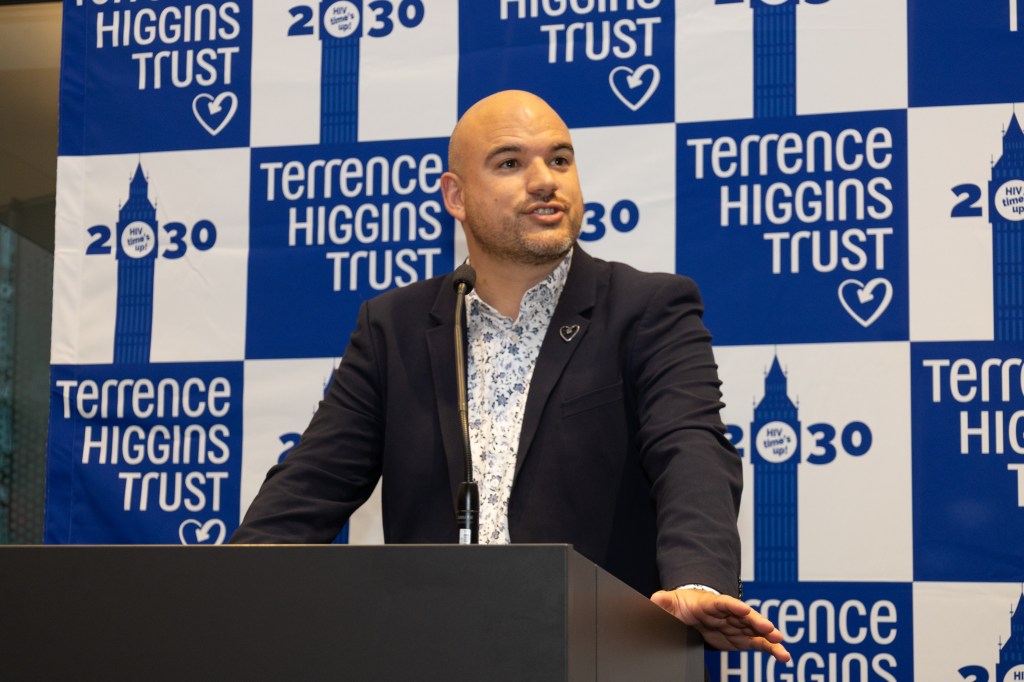 May 24 2025, 08:15
May 24 2025, 08:15 The new gonorrhoea vaccine has the potential to “inspire” a shift from treatment to prevention across the UK’s sexual health services, Richard Angell OBE – chief executive of the Terrence Higgins Trust – writes exclusively for PinkNews.
When I was 17, I reached a milestone that will be familiar to many gay and bi men: I went to an unfamiliar building, hidden down a side street and gave a fake name to a stranger. I’m talking, of course, about my first sexual health check-up.
In one encounter the condom had broken – so despite Section 28 banning talk about gay people, let alone gay sex, I knew what had to do. I put on my big boy pants and sat in the waiting room. I remember the wait feeling forever, but it wasn’t the wait on the day that was the torment, in those days you had to wait four days for the result. My brain went into overdrive and time and again my mind would replay adverts of tombstones.
When it turned out I just had gonorrhoea, I was delighted. Some antibiotics and I’d be right as rain; up to no good again in a fortnight. Phew.
It was 2001 when I surreptitiously entered that local sexual health clinic for the first time, convinced I’d run into a teacher or one of my mum’s friends who would demand to know what on earth I thought I was doing there.
At the time I didn’t stop to think of where I appeared in the statistics. It turns out I was one of 22,000 people who were diagnosed with gonorrhoea in 2001. Jump forward, and it’s over 85,000 a year now – the highest since records began, over a century ago. Nearly half of cases were in gay and bisexual men.

How things have changed.
Sadly, now it’s no longer always as simple to treat, with a number of antibiotic-resistant strains emerging.
If this was any other sort of health issue, a nearly 400% rise in cases in two decades would be seen as a crisis. Instead, sexual health services have been at the sharpest end of cuts to the public health grant, with budgets slashed by a third between 2015 and 2024. A prudishness around sexual health and a suspicion that people who get an STI are to blame for having too much fun, can mean decision makers are reluctant to prioritise it.
But telling people to just stop having sex has a several-millennia-long track record of failure. In circumstances where budgets will remain tight, we need better tools so people are able to have fun while feeling confident they are looking after their health.
Now we also have a prevention tool for one of the most common STIs in the UK.
It’s actually an existing vaccine against the Meningococcal bacteria which is a common cause of childhood meningitis. Since 2015, it’s been one of the jabs which is recommended as standard for infants in England.
Recently it’s also been found to be effective at preventing up to 40% of gonorrhoea cases. For those who get the jab, it’s great to be able to cut your risk of acquiring gonorrhoea by over a third, but the big impact will be at the population level. Researchers at Imperial College have estimated it could avert 100,000 cases of gonorrhoea over the next decade.
Nearly 25 years since my anonymous first trip to the clinic, I proudly talk about HIV and sexual health every day as chief executive of Terrence Higgins Trust. When the Joint Committee of Vaccination and Immunisation recommended that the gonorrhoea vaccine have a targeted roll-out – including for gay and bisexual men – in November 2023, we called on the government to make it happen.
It is fair to say this one has taken some badgering but the new government has been far more receptive and has already rolled out the mpox vaccination, recommended on the same date.
We raised it with the Public Health minister when we met a week after the election and have been pressing for it since. It is to the Government’s credit that they listened – a welcome recognition of the importance of sexual health to allowing people to live better lives.
Each person who doesn’t get gonorrhoea because of the vaccine will have stopped a potential chain of transmission to their sexual partners and a potential antibiotic resistant strain. I hope it won’t just turn the tide on gonorrhoea cases but help inspire a shift from treatment to prevention across our sexual health services.
The vaccine will be available from the autumn, so put it in your calendar now to make an appointment with your local clinic. And while you’re there, make the most of your time. If you’re not taking PrEP, talk with a clinician about whether it would be right for you, and ask about other vaccinations, such as for mpox, hepatitis and HPV.
I’ll be the first in line, and I’ll be thinking about that nervous seventeen-year-old when I do.
The post Why I’ll be getting the new gonorrhoea vaccine appeared first on PinkNews | Latest lesbian, gay, bi and trans news | LGBTQ+ news.